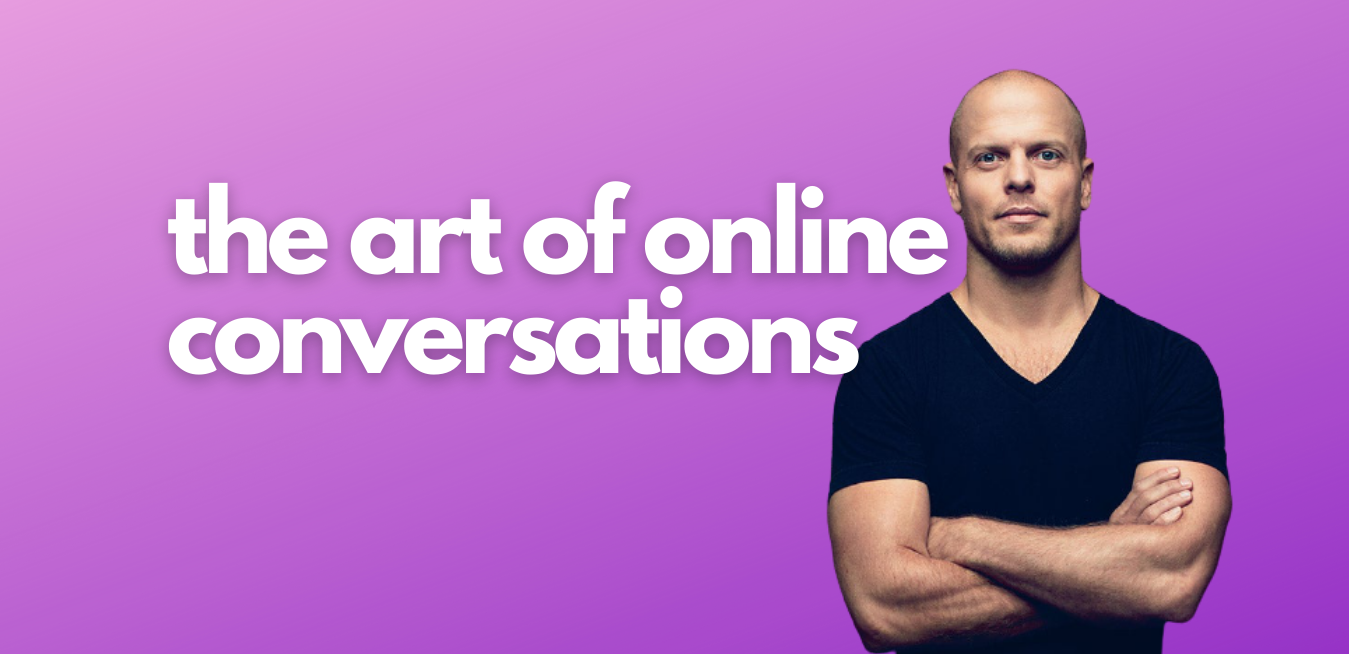Tim Ferriss and the Art of Online Conversations

Over the past few years, you might have noticed an increase in the popularity of podcasts and the creation of audio-based content. Producing a podcast today is considered an essential networking and promotional tool. Major news networks, entrepreneurs, and politicians all want to be on podcast shows to deliver their message or sell a product. The launch of social audio apps like ‘Clubhouse‘ and Twitter Spaces continue to push audio as a medium for content creation, marketing, and networking.
While the reason for this increase in audio-based platforms is a discussion in itself, the real success of these types of shows often relies on the conversational skills of the hosts and the guests. Recorded audio services like podcasts, and especially live audio apps likes ‘Clubhouse’, are exposing how well we communicate and how well we can hold a conversation. One show which I have been following for quite a while is ‘The Tim Ferriss Show‘, hosted by its namesake – Tim Ferriss, who started the podcast back in 2008. The show has now passed the 500 million download mark and is considered one of the success stories in podcast history, largely due to Ferriss’s ability to connect with his guests and his excellent conversational skills, honed over the past years.
In Ferriss’s own words, starting a podcast is “a minimalist experiment for improving overall thinking: improving your ability to ask questions, fixing verbal tics (e.g. “ummm” “ahhhh”), getting better at listening without interrupting, learning to sit with silence until someone else continues, etc”. He recommends starting a non-interview-based podcast because doing so will “improve your ability to craft good narratives, tell stories, and be a better human”. Tim Ferriss has a way to make guests open up about aspects of their life that they have never spoken about and asks questions that they have rarely been asked about. Over the past weeks, I have been trying to find out how one can become a better conversationalist on online audio platforms by taking Ferriss’s own best practices.

So how does one become “a better human” and a great conversationalist? The Tim Ferriss approach requires five main steps:
- Preparation
- Listening and paying attention
- Asking the right questions
- Knowing when not to speak
- Genuine curiosity
Preparation
COVID-19 ensured that thousands of podcasts and online shows are held exclusively online and in the process altering the way we communicate in one-on-one or group conversations. In online conversations, looks and behaviour matter less than your message and delivery. The best way to do well on a podcast or a live audio session is to make sure you prepare yourself before the event. It helps to understand the format and the objective of the podcast or the show that you have been invited to by listening to previous episodes. This will help you plan ahead by getting to know the kind of questions that get asked and what is usually expected of guests.
At this stage, you should also be aware of what your unique value proposition is. This is what makes you unique, the real reason why you were invited to the show in the first place. Plan ahead on how you will share your expertise and in what manner, but do not focus only on what you will be saying.
Flexibility is important as a pleasant online conversation is mostly about listening to others. Try to find as much public information as possible on the other parties using Google and social media to better understand their background, and what lessons you want to extract from the participants. Many of this information can be extracted during the show itself, but researching the guest as much as possible from before will only help your cause.
Tim Ferriss is known to extensively research his guests before every episode. During the show, he often recalls works that his guests were part of, from different online and offline sources, such as previous interviews, books that they wrote, and even conversations with mutual friends about their personal relationship. Sometimes, the invited guests themselves send him information, which Ferriss uses to get a better understanding of where they are coming from. While this work is rarely seen (or heard) during the podcast show, this is often one of the most important parts of the interview.
Listening and paying attention
A good audio event is a mixture of previously prepared questions and serendipitous questions. While you can prepare the former, you have to listen and pay attention to what your guest or the other participants say in order to learn new information and follow up on it.
We are used to having our attention spread over a number of things when listening to others speak. This even happens during one-to-one, in-person conversations. While one half of your mind is thinking about the words you’re hearing, the other half is probably thinking about what you’re going to say right after the speaker ends, or what you’ll be doing after you’re done with the show. Just like in meditation, mindful listening is the only way to have a proper conversation. Therefore, both as a host, a guest, or as part of an event, the only real way to have a great conversation is to pay attention to what others are saying 100% of the time.
Tim Ferriss makes sure to listen to what his guests are saying and avoids interrupting. You can clearly see this trait on the podcast shows that were also video recorded for YouTube. Ferriss does not fidget with desktop notifications and puts his phone on the ‘Do Not Disturb’ function so as to avoid any distractions during the interview. He also often uses non-verbal cues to show that he is attentive to what the guest is saying, such as nodding his head, smiling, etc.
This is not just because he is being polite, he behaves in the same way with his close friend Kevin Rose too. This short clip from the longer conversation with Rose clearly shows the natural behaviour of Tim Ferriss on his podcast.
Asking the right questions
A conversation is a two-way street – one must share information with someone else in order for it to be successful. After paying attention to what your guests or speakers just said, you will need to ask questions in order to better organise the new information you just acquired for your listeners, as well as to gather new information that might not yet have been disclosed. Don’t just ask generic questions, as you will only get the usual answers. Try to tailor questions to the specific guest and their experience, as well as questions that they probably don’t get asked a lot. The right questions do not necessarily have to be the most complex. You can get insight into someone’s mind by asking the most basic questions. In his interview with Daniel Ek, Tim Ferriss asks the Spotify founder about his Twitter handle – ‘@eldsjal’ and what does this mean. Ferriss managed to find out more about Ek’s philosophy by asking about something everyone knew but may have never inquired about.
In his book ‘Tools of Titans’, Tim Ferris also talks about “the power of the absurd question”, and ‘constraint questions’. Both of these are methods that good podcasts or live event hosts use so that the speaker does not resort to their default framework. He says that “asking the right questions, the embarrassing questions, is a superpower”. Asking the right questions is also important when you have a goal to reach in mind. If you would like your guest to speak about a specific topic and they continuously veer off-course, you will have to know how to ask the right questions in order to direct the conversation back to the original or intended topic, without sounding forceful. Ferriss is a master of this and regularly guides the conversation to areas he wants to cover without sounding rude or forceful.
Emotional intelligence here plays a very important part. People with higher emotional intelligence or emotional quotient (EQ) are great at engaging with others. An important aspect of EQ is empathy – to understand and keep in mind other people’s feelings. As a participant on an audio show, one has to master empathy in order to be able to ask the right questions. If the guest is explaining a traumatic event in his or her life, your job is to try and put yourself in their shoes about how such an experience could have affected them. If you are guided by empathy, then you will probably be able to extract the right kind of questions from the situation.
Knowing when not to speak
A good conversation is also the result of knowing when you don’t have to speak. This relates to the ‘listening and paying attention’ step but goes beyond that as well. Ferriss is very hesitant to stop his guests while they are speaking, contrary to some podcasters who are infamous for jumping on guests as soon as they are trying to explain something, often adding their own view or version of the events. This not only comes off as rude and annoying to the speaker and the listeners but also destroys the very definition of a conversation, as it becomes very one-sided.
Try to take it as a rule that if you don’t have something useful to add to a conversation, it is usually better not to speak and interrupt others. The only instance when Tim Ferriss stops his guests is to ask about something they just said in order to clarify it for the listeners. The episode with Kevin Hart from 2020 is a great example of this. Take a look at how Ferriss refrains from interrupting Hart, even when the latter is thinking about what to say next. He gives him space to elaborate on his thoughts and only speaks when asked a question by Kevin Hart himself.
Genuine curiosity
Last, but not least, is Tim Ferriss’s genuine curiosity in better understanding how his guests have achieved their current status in whatever field they excel in. Every guest on the Tim Ferriss Show has been invited because Ferriss himself is interested in the work they have done in their respective field. Many of the questions and the resulting conversations are indeed the result of Ferris’s curiousness about certain aspects of the guest – career, relationships, wealth, etc.
Curiosity helps to make conversations more interesting, but only those hosts or guests that are really interested in the conversation topic manage to come off as genuine. It shows when people are really interested in the subject or are there just to sell a product or a service. A curious conversationalist always manages to ask compelling questions and never takes the answers provided as a fact.
This is not necessarily the domain of the host. A good guest also picks up on the questions being asked or how the host is replying and takes it forward with related comments. Whatever your role on a podcast, or on an online audio event, remain open to be challenged about what you know and what you think the other person will speak about. Everyone has a story worth hearing, and if you’re curious enough, you’ll be able to get more out of the conversation you are having and hopefully learn something new along the way.


